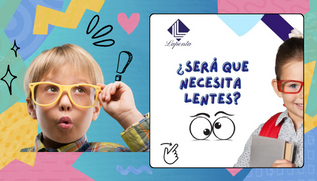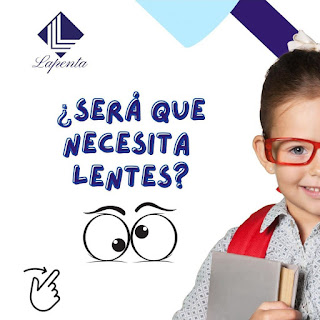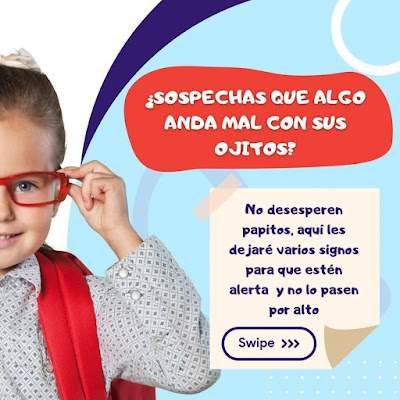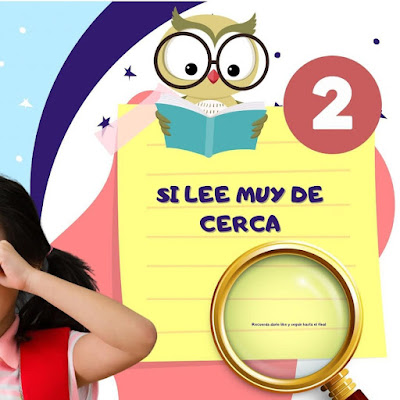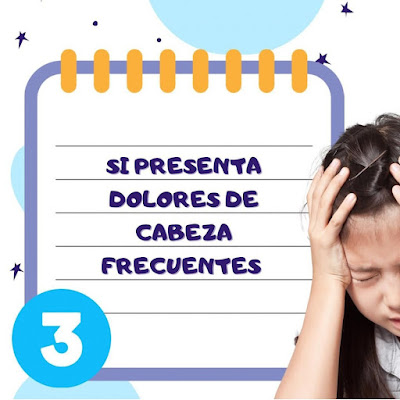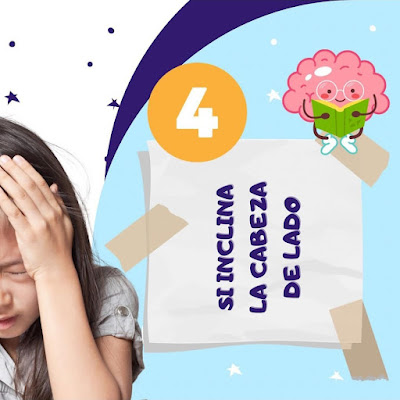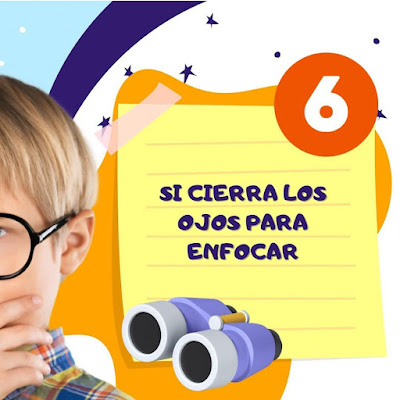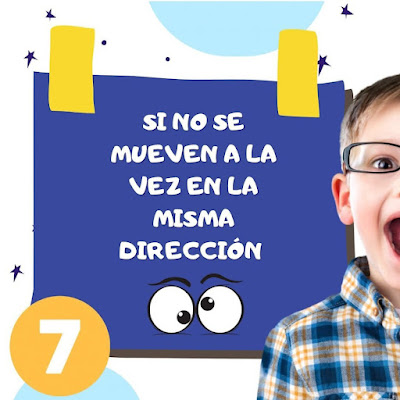COMO SABER SI TU NIÑO NECESITA LENTES
HOW TO KNOW IF YOUR CHILD NEEDS GLASSES
EDITORIAL ESPAÑOL
==================
Podría darse el caso de que tu hijo necesitare lentes porque tiene
un defecto en la visión, desde el mismo nacimiento, pero que
no te has percatado, y aquí te voy a dar unos consejos para
descubrir si realmente son necesarios:
Uno de los aspectos a tomar en cuenta son los factores
GENÉTICOS, algunos niños presentan deficiencia de la vista, sea
MIOPÍA, ASTIGMATISMO, HIPERMETROPÍA u otras, porque alguno
de sus padres tíos o abuelos utilizan lentes desde niños, y ese factor
se transmite por los genes, así de sencillo.
Pero en muchos casos simplemente se presenta el defecto visual
espontáneamente, por lo tanto hay que vigilar el comportamiento y actitudes de los
niños para saber si hay déficit de la visión y necesitará usar
lentes, espejuelos, o gafas, esos son los nombres más comunes.
Entonces cuáles son los síntomas o signos que te pueden indicar
que algo no anda bien con la visión del niño ?, aquí te los
nombro:
1.) ENFOQUE: Ve la televisión, pantallas y
cuadernos muy de cerca, prácticamente pegados a los ojos en caso
de la miopía, o aleja la cabeza buscando enfoque de los músculos
de la visión.
2.) DOLOR DE CABEZA FRECUENTE: Este es uno de los
síntomas más comunes, al no poder enfocar y tener la visión
"borrosa", los músculos que proporcionan el enfoque están en
constante movimiento y eso a la larga provoca
dolor de cabeza, es cuál es intenso y
repetitivo.
3.) SENTARSE CERCA DE OBJETOS: PIZARRA y TV; En el
colegio se sienta en las filas delanteras para "VER MEJOR" y
en casa "CERCA DEL TELEVISOR", este es otro síntoma muy
común.
4.) PARPADEAR FRECUENTEMENTE: y cerrar los
ojos, esto lo hacen frecuentemente "buscando" enfoque, al
no ver nítidamente los objetos.
5.) INCLINAR LA CABEZA HACIA ADELANTE:, otro
síntoma muy común, porque están buscando "enfocar mejor"
ante el déficit.
6.) DÉFICIT EN LA LECTURA: y en el
rendimiento escolar, el hecho de no enfocar bien hace
que el niño le cueste leer fluidamente y eso retrasa
su aprendizaje, porque confunde las letras al verlas
borrosamente.
7.) ENROJECIMIENTO DE LOS OJOS Y /O
ESTRABISMO:
el no ver bien provoca un esfuerzo excesivo para
tratar de enfocar, eso se traduce muchas veces en
enrojecimiento de la conjuntiva ocular o estrabismo, los
ojos pierden su alineación normal.
8.) USAR EL DEDO COMO GUÍA PARA LEER: otra
práctica común, el dedo les sirve de indicador
para no "perderse" cuando están leyendo.
9.) ENTRECIERRA LOS OJOS PARA ENFOCAR:
al entrecerrar los ojos el enfoque mejora de
forma natural, otro detalle que puedes observar
en un niño con problemas de la visión.
10.) FROTAR CON FRECUENCIA LOS OJOS: en la búsqueda de una mejor visión el niño se
frota los ojos intuitivamente, buscando
"aclarar la visión".
OTROS: ladear la cabeza hacia los
hombros, lagrimeo constante.
Hay que tener en cuenta que los niños no
están conscientes de que necesitan usar
lentes, y por ello ante cualquier sospecha
deberás
consultar con el oftalmólogo a los 6
meses de edad, primariamente, y hacer
exámenes de la vista periódicamente. Y
como norma antes de entrar al preescolar
alrededor de 5 a 6 años de
edad.
En caso de que los lentes
sean necesarios hay que explicar al niño el "porqué"
del uso de los mismos y si hay
familiares con lentes (padre, madre,
hermano, tío, primo) enseñarles con el
ejemplo. Al final los aceptaran porque
ELLOS SABEN que con ellos veran
perfecto todo el entorno.
EDITORIAL ENGLISH
==================
It could be the case that
your child needs glasses
because he has a
vision defect, from
birth,
but that you have not
realized, and here I am
going to give you some tips
to discover if they are
really necessary:
One of the aspects to take
into account are
GENETIC factors, some
children have vision
deficiency, be it
MYOPIA, ASTIGMATISM,
HYPERMETROPIA
or others, because some of
their parents, uncles or
grandparents have used
glasses since they were
children, and this factor is
transmitted through the
eyes. genes, it's that
simple.
But in many cases the
visual defect simply occurs
spontaneously,
therefore the behavior and
attitudes of the children
must be monitored to know if
there is a vision deficit
and they will need to use
lenses or
glasses, those are the most common
names.
So what are the symptoms or
signs that can indicate that
something is not right with
the child's vision? Here I
name them:
1.) FOCUS: Watch
television, screens and
notebooks very closely,
practically glued to your
eyes in case of myopia, or
move your head away seeking
focus on your vision
muscles.
2.) FREQUENT HEADACHE:
This is one of the most
common symptoms, by not
being able to focus and
having "blurred" vision, the
muscles that provide focus
are in constant movement and
that in the long run causes
a headache, that is
which is intense and
repetitive.
3.) SITTING NEAR
OBJECTS:
BOARD and TV; At school he
sits in the front rows to
"SEE BETTER" and at home
"NEAR THE TV", this is
another very common
symptom.
4.) BLINK FREQUENTLY:
and close your eyes, they do
this frequently "looking
for" focus, by not seeing
objects clearly.
5.) TILT THE HEAD
FORWARD:
another very common symptom,
because they are looking to
"focus better" in the face
of the deficit.
6.) DEFICIT IN READING: and in school
performance, the fact of not
focusing well makes it
difficult for the child to
read fluently and this
delays his learning, because
he confuses the letters by
seeing them blurry.
7.) REDNESS OF THE EYES
AND/OR STRABISMUS:
Not seeing well causes
excessive effort to try to
focus, which often
translates into redness of
the ocular conjunctiva or
strabismus, the eyes lose
their normal
alignment.
8.) USE THE FINGER AS A
GUIDE TO READ:
another common practice, the
finger serves as an
indicator so as not to "get
lost" when they are
reading.
9.) ENCLOSES THE EYES TO
FOCUS:
By squinting your eyes,
focus improves naturally,
another detail that you can
observe in a child with
vision problems.
10.) FREQUENTLY RUB THE
EYES:
In search of better vision,
the child intuitively rubs
his eyes, seeking to "clear
his vision."
OTHERS: tilting the
head towards the shoulders,
constant tearing.
It must be taken into
account that children are
not aware that they need to
wear glasses, and therefore,
if you have any suspicion,
you should consult with
the ophthalmologist at 6
months of age, primarily, and do
periodic eye exams. And as a
rule before entering
preschool around 5 to 6
years of age.
If glasses are
necessary,
you must explain to the
child the "why" of using
them and if there are
relatives with glasses
(father, mother, brother,
uncle, cousin) teach them by
example. In the end they
will accept them because
THEY KNOW that with
them they will see the
entire environment
perfect.

